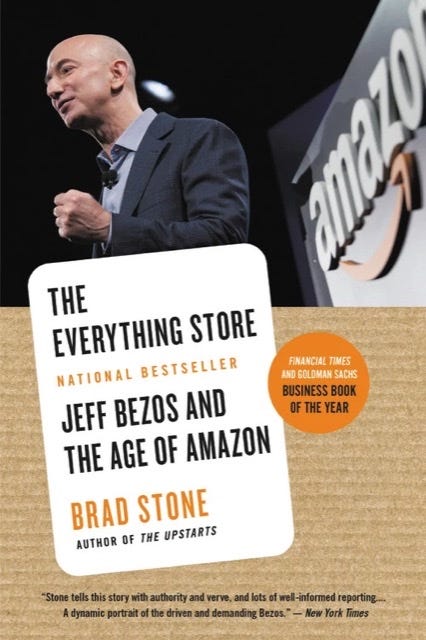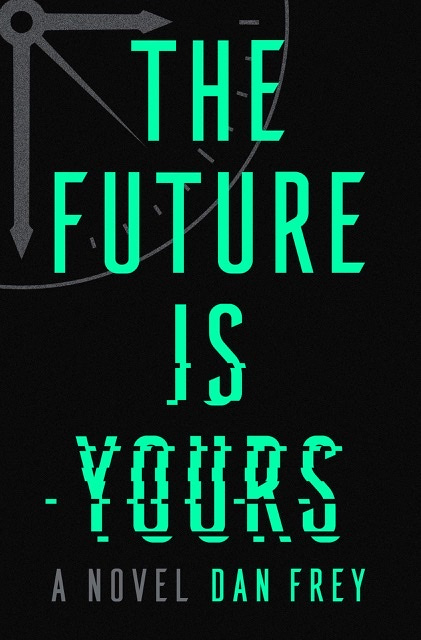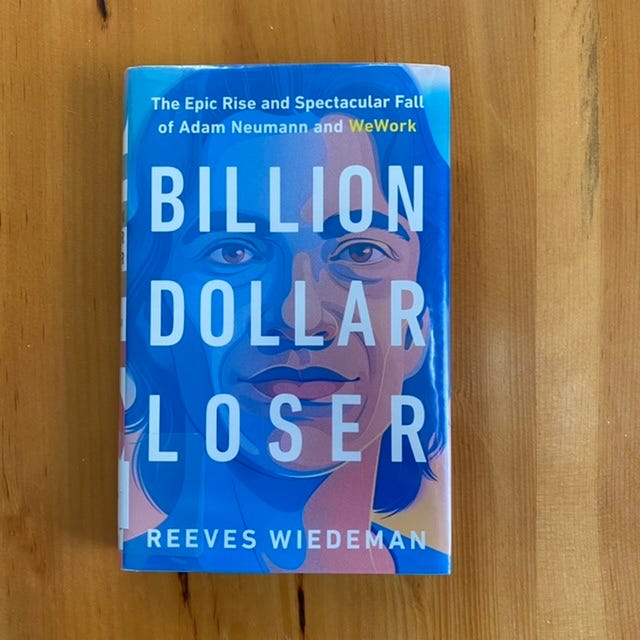What to Read Next (No. 178): The Future
Sometimes I get myself into a reading obsession that can’t be quenched. In the last few weeks, that’s been delving back into the world of Silicon Valley and the technology startups that have so radically changed our world.
The best tech companies manage to manifest the future they’re predicting; the worst present us with an Oz-like illusion that leaves us not only disappointed, but permanently jaded too. After the likes of Theranos, WeWork, and even over-valued Uber, it’s hard to envision any company following through with their lofty ideas.
That all said, this week I’m bringing you three (more!) techie books to indulge in. Each tells a great story.
The Everything Store: Jeff Bezos and the Age of Amazon by Brad Stone
Published: 2013 | Pages: 386
Of all the tech founder stories I’ve read, Amazon is perhaps the most boring. That isn’t to say the book is boring — it’s not. But Amazon’s story just hasn’t had much drama. They’ve had a few hiccups, but for the most part it’s been a meteoric rise to the most powerful company in the world.
Brad Stone, a longtime tech reporter, has actually already written a follow-up that was just published about a month ago. That one was sent to me by the publisher, but obviously I had to read what’s functionally the first volume of Stone’s work on the company.
Jeff Bezos’ story is covered in bits and pieces, but The Everything Store is certainly more about Amazon itself. Though Bezos indeed had a love for books, it was the simplicity of the product and its ability to scale that led Amazon to first and foremost be known as a bookstore. From the beginning, though, the idea was that Amazon would someday be basically the Walmart of the internet, and then some—truly an “everything” store.
And what an everything store it is! You can buy live ladybugs, a signed Michael Jordan rookie card, even a tiny house. Only Bezos himself could’ve predicted what Amazon would become.
Though the story itself isn’t all that dramatic, Amazon’s—and Bezos’—ruthlessness is on display almost from day one. Contained within these pages are the company’s survival of the dot-com crash, the creation of the industry-changing Kindle, and the push to the massive market share it carries and the insane amount of debt it carried to reach that point. (That part would be a foreshadowing of internet companies/valuations to come.)
The Everything Store brings us up to about 2013. Alexa hasn’t been introduced yet, Bezos is still married, and the public furor over the company’s dominance hasn’t come to full force yet. Those stories await me in Amazon Unbound. You’ll be the first to hear my thoughts. In the meantime, this is an essential story about one of the first internet companies out there.
The Future Is Yours by Dan Frey
Published: 2021 | Pages: 352
“If you get stuck in old fashioned morality, you can’t move forward.”
Since Michael Crichton’s passing, I have pined for a writer to come along and give me the same sort of techno and bio thrillers that he mastered over the course of his career. David Koepp’s Cold Storage certainly reminded me of him. And though Dan Frey’s The Future Is Yours isn’t quite on that same level, it also had shades of Crichton.
In this novel, two friends, one a scientist and one a master salesman, have created The Future. It’s a computer that connects to the internet one year from now. Imagine the possibilities. Your career. Your love life. Stock prices. World politics. There’s some good to be found, of course, but as the reader can easily surmise, the invention ends up mostly being about making money and about nations militarily one-upping each other.
Those easily-guessed aspects aren’t the most interesting part of the novel though. What really captivated my attention was how The Future impacted the friendships, familial ties, romances, and even coworking relationships of everyone involved. Frey astutely recognizes that even though technology can change circumstances on a broad level, it also changes our day-to-day interactions with everyone around us. One is more obviously sinister; one is perhaps more interesting, frankly.
The details of how The Future works were a little fuzzy. Frey isn’t the master explainer that Crichton was—he could always make it seem like his plotlines were a distinct possibility in the years to come. That’s not quite the case here. But for the purposes of my own entertainment, that wasn’t a problem. I also loved the epistolary format (I’m a sucker for it, actually)—the story is told entirely in the form of emails, texts, online articles, etc. My final recommendation is simple: I read it in one day during a snowstorm in March.
Billion Dollar Loser: The Epic Rise and Spectacular Fall of Adam Neumann and WeWork by Reeves Wiedeman
Published: 2020 | Pages: 324
Though I had heard of WeWork before its epic downfall, I wasn’t all that familiar with the story or the eccentric founder Adam Neumann. I figured it was another Uber—an overvalued company that simply set its sights too high, but would still be successful in the grand scheme of things.
Well, Neumann himself ensured that this story would be very different. Much like Elizabeth Holmes, Neumann was an ideas guy. The financials didn’t matter, the tech didn’t matter (he rarely used a computer or email)—all that mattered was securing more investor money with bolder and bolder claims for the company’s future. (It should be mentioned this the investors were, in many cases, equally responsible for pushing WeWork’s valuation into the stratosphere.)
Instead of being the ultimate technology company that would bring a sense of community to the world—which is how Neumann always pitched it—WeWork was a poorly performing real estate leasing company run by delusional nepotist.
Bad Blood set the ultimate standard for this type of book, in part because that story was just so insane; Billion Dollar Loser falls just below that upper rung. It was highly entertaining, unendingly dramatic, and always compelling. As with most books in this category, I devoured it in the course of just a few days. After an enticing slow burn to start, Wiedeman starts to bring the crazy to the forefront and there’s a new jaw-dropping anecdote on nearly every page.
Anna Weiner, an author I love, sums this book up just perfectly: “Batshit, unsettling, and wholly satisfying.”
Thanks so much for subscribing. I really appreciate the support!
If you enjoy the newsletter, please consider sharing it or gifting a subscription:
-Jeremy




